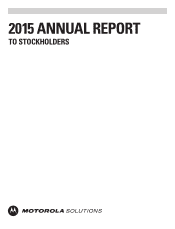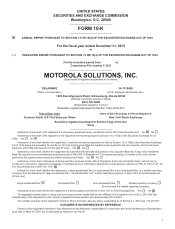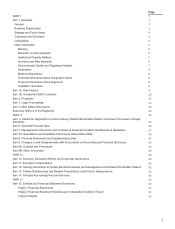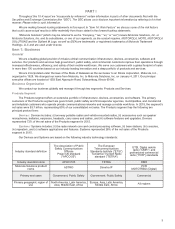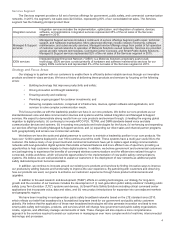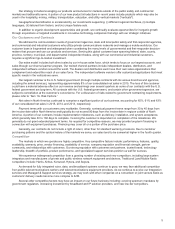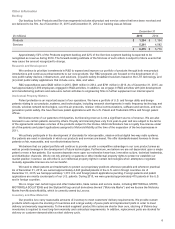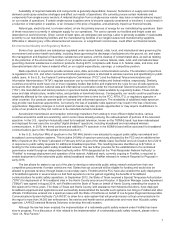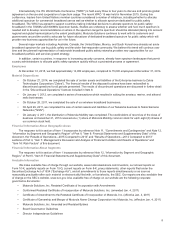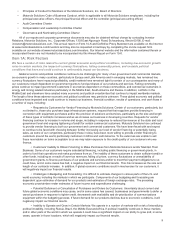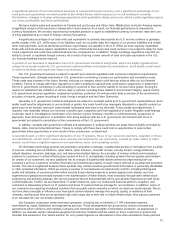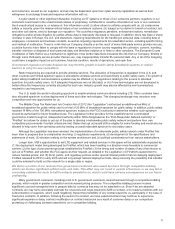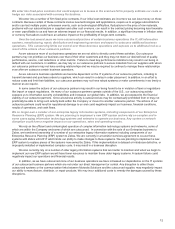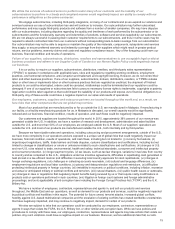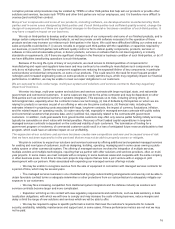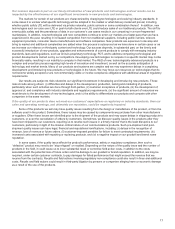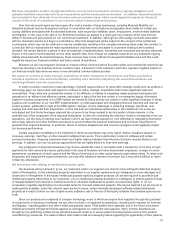Motorola 2015 Annual Report Download - page 11
Download and view the complete annual report
Please find page 11 of the 2015 Motorola annual report below. You can navigate through the pages in the report by either clicking on the pages listed below, or by using the keyword search tool below to find specific information within the annual report.10
A significant amount of our international business is transacted in local currency and a significant percentage of our
cash and cash equivalents are held outside of the United States, which exposes us to risk relating to currency
fluctuations, changes in foreign exchange regulations and repatriation delays and costs, which could negatively impact
our sales, profitability and financial flexibility.
We have sizable sales and operations in Canada and our Europe and Africa, Asia, Middle East, and Latin America regions.
A significant amount of this business is transacted in local currency. As a result, our financial performance is impacted by
currency fluctuations. We are also experiencing increased pressure to agree to established currency conversion rates and cost
of living adjustments as a result of foreign currency fluctuations.
A significant percentage of our cash and cash equivalents is currently held outside the U.S. and we continue to generate
profits outside of the U.S., while many of our liabilities, such as our public debt, the majority of our pension liabilities and certain
other cash payments, such as dividends and share repurchases, are payable in the U.S. While we have regularly repatriated
funds with minimal adverse impact, repatriation of some of the funds has been and could continue to be subject to delay for local
country approvals and could have potential adverse tax consequences. In addition, foreign exchange regulations may limit our
ability to convert or repatriate foreign currency. As a result of having a lower amount of cash and cash equivalents in the U.S.,
our financial flexibility may be reduced.
A portion of our business is dependent upon U.S. government contracts and grants, which are highly regulated and
subject to oversight audits by U.S. government representatives and subject to cancellations. Such audits could result
in adverse findings and negatively impact our business.
Our U.S. government business is subject to specific procurement regulations with numerous compliance requirements.
These requirements, although customary in U.S. government contracting, increase our performance and compliance costs.
These costs may increase in the future, thereby reducing our margins, which could have an adverse effect on our financial
condition. Failure to comply with these regulations or other compliance requirements could lead to suspension or debarment
from U.S. government contracting or subcontracting for a period of time, and the inability to receive future grants. Among the
causes for debarment are violations of various laws or policies, including those related to procurement integrity, export control,
U.S. government security regulations, employment practices, protection of criminal justice data, protection of the environment,
accuracy of records, proper recording of costs, foreign corruption and the False Claims Act.
Generally, U.S. government contracts and grants are subject to oversight audits by U.S. government representatives. Such
audits could result in adjustments to our contracts or grants. Any costs found to be improperly allocated to a specific contract or
grant may not be allowed, and such costs already reimbursed may have to be refunded. Future audits and adjustments, if
required, may materially reduce our revenues or profits upon completion and final negotiation of audits. Negative audit findings
could also result in investigations, termination of a contract or grant, forfeiture of profits or reimbursements, suspension of
payments, fines and suspension or prohibition from doing business with the U.S. government. All contracts with the U.S.
government are subject to cancellation at the convenience of the U.S. government.
In addition, contacts with government officials and participation in political activities are areas that are tightly controlled by
federal, state, local and international laws. Failure to comply with these laws could cost us opportunities to seek certain
government sales opportunities or even result in fines, prosecution, or debarment.
A security breach or other significant disruption of our IT systems, those of our outsource partners, suppliers or those
we manufacture, install, and in some cases operate and maintain for our customers, caused by cyber attack or other
means, could have a negative impact on our operations, sales, and operating results.
All information technology systems are potentially vulnerable to damage, unauthorized access or interruption from a variety
of sources, including but not limited to, cyber attack, cyber intrusion, computer viruses, security breach, energy blackouts,
natural disasters, terrorism, sabotage, war, and telecommunication failures. As a provider of mission-critical communications
systems for customers in critical infrastructure sectors of the U.S. and globally, including systems that we operate and maintain
for certain of our customers, we face additional risk as a target of sophisticated attacks aimed at compromising both our
Company’s and our customers’ sensitive information and intellectual property, through means referred to as advanced persistent
threats. This risk is heightened because these systems may contain sensitive governmental information or personally identifiable
or other protected information. While we employ a number of countermeasures and security controls, including training and
audits and utilization of commercial information security threat sharing networks to protect against such attacks, we have
experienced a gradual and steady increase in the sophistication of these threats, most noticeably through well-crafted social
engineering and phishing attempts. We cannot guarantee that all threat attempts will be successfully thwarted even with these
countermeasures. Further, we are dependent, in certain instances, upon our outsourced business partners, suppliers, and
customers to adequately protect our IT systems and those IT systems that we manage for our customers. In addition, some of
our customers are exploring broadband solutions that use public carrier networks on which our solutions would operate. We do
not have direct oversight or influence over how public carrier networks manage the security, quality, or resiliency of their
networks, and because they are an attractive high value target due to their role in critical infrastructure, they expose customers
to an elevated risk over our private networks.
Our Company outsources certain business operations, including, but not limited to IT, HR information systems,
manufacturing, repair, distribution and engineering services. These arrangements are governed by various contracts and
agreements which reference and mandate Company and international standards of information protection, as appropriate. In
addition, we maintain certain networked equipment at customer locations and are reliant on those customers to protect and
maintain that equipment. The “attack surface” for us to protect against our adversaries is thus often extended to these partners

